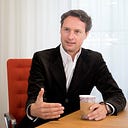It is quite curious how enthusiastically many of us have jumped on a positive psychology bandwagon, often suggesting that already the ancient Greek anticipated our modern “wisdom” of mindfulness and meditation. Of course, this is mostly incorrect…
“Gnōthi seauton”, the famous maxim at the Temple of Delphi, correctly translated means something like “[Human], Know Thy Place”! An extensive knowledge of inner feelings and thoughts had little relevance for the art of good living in a pantheistic Greek society of the time. What mattered most was acting in accordance with divine laws and fate. In Greek mythology, in fact, humans have no meaningful place — if they appear it is in secondary roles. The fact that the Temple of Delphi was dedicated to Apollo (son of Zeus and Leto) is a pretty clear hint of who was in charge at the time…
Here, the second grand maxim of the Temple adds further insights: “meden agan” — “nothing in excess”! This, again, was a reminder to all humans not to desire what only Gods could have. Immortality, above all, but also more than the merited share of earthly goods or desires. Unsurprisingly, this second recommendation has found much fewer zealous followers in modern times.
That all said, and moving beyond some willful blindness in its translation, the statement “Know thyself” is problematic in other ways. It simply is not enough to know ourselves to act wisely. Firstly, our identity is relational, rather than some hidden inner place to discover — we must know ourselves in dynamic interaction with the whole. We must learn who we are in relation to others, to societal norms and justice, and to a life goal that provides us with drive and meaning. Secondly, contrary to Socrate’s clever suggestion, wisdom was never (just) knowledge or consciousness. It’s not enough to be intelligent. It also needs character — the habituous enactment of knowledge. Finally, “know thyself” often perpetuates a self-centric and hubristic view of the world. It distracts from the fact that we are often more symptom, rather than cause. We are shaped by a wider entangled system which not only drives our unconscious “logics” of action, but also determines our affordances and constraints. Therefore, in order to transform ourselves within any social or organisational system, personal agency is never sufficient — it also requires a revision of formal and informal institutions, and our competent ability to participate in its change.
So, rather than just how to “Know Themselves”, we should teach people how to “enact themselves habitually in the right relation to the whole, for the sake of making themselves and the whole better”. That certainly would be less memorable ;-), but could prove more useful.
Maybe, the original “Know thy place” is the better translation after all: not only as a reminder of our human limitations, but as an earnest invitation to find a meaningful place in life and society where we can use our unique gifts to lift each other up for the good of all.
From: “Sunday Morning Thoughts on LinkedIn” — I will report some of the interesting LinkedIn dialogues here, paraphrased and applying the Chatham House Rule — trying to protect some of the sentiments, thoughts, and above all our stimulating discussions from oblivion ;-)
